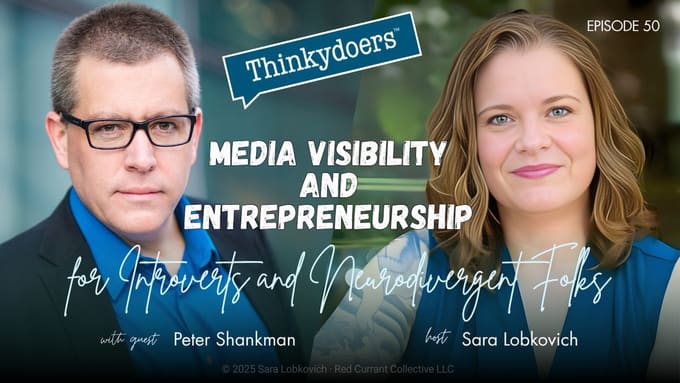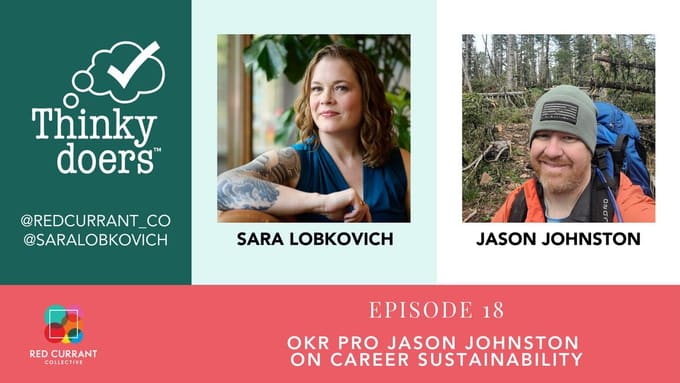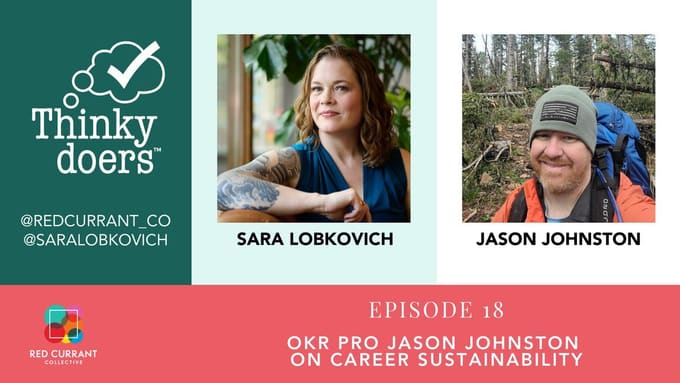Real People, Real Stories: OKR Coach and Specialist Jason Johnston on Career Sustainability
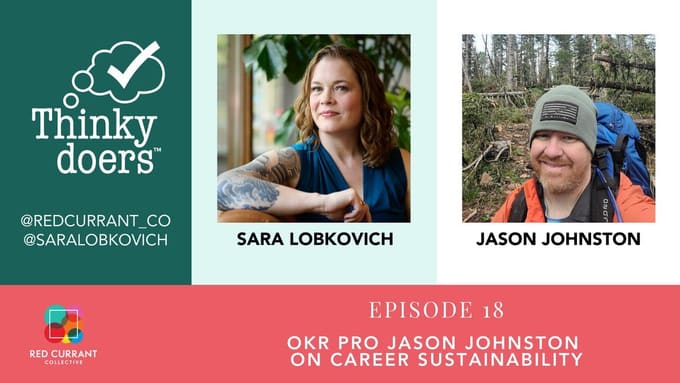

How do you find balance as a Thinkydoer with a busy, curious, learning-focused brain?
Today, we explore this question (and more) as I continue my insightful conversation with Jason Johnston, OKR Practice Lead at Genetec. (If you missed Part 1, pop back to Episode 17 and then come back here after.)
Tuning in, you’ll discover some of the most profound lessons from Jason’s unique and varied career.
From facing a career-altering setback J.J. considers his “greatest professional accomplishment,” to finding new paths forward, his journey demonstrates the importance of adaptability and continuous learning.
Join us as we explore how personal passions outside of work—whether it’s building LEGO, climbing mountains, or repairing antique typewriters — can recharge our professional lives, and why disconnecting and taking proper breaks is essential for reconnecting with our intrinsic motivation.
Don’t miss this enriching conversation as we dive deep into the human side of leadership!
How do you find balance as a Thinkydoer with a busy, curious, learning-focused brain?
Today, we explore this question (and more) as I continue my insightful conversation with Jason Johnston, OKR Practice Lead at Genetec. (If you missed Part 1, pop back to Episode 17 and then come back here after.)
Tuning in, you’ll discover some of the most profound lessons from Jason’s unique and varied career.
From facing a career-altering setback J.J. considers his “greatest professional accomplishment,” to finding new paths forward, his journey demonstrates the importance of adaptability and continuous learning.
Join us as we explore how personal passions outside of work—whether it’s building LEGO, climbing mountains, or repairing antique typewriters — can recharge our professional lives, and why disconnecting and taking proper breaks is essential for reconnecting with our intrinsic motivation.
Don’t miss this enriching conversation as we dive deep into the human side of leadership!
Key Points From This Episode:
-
How to check out the new No-BS OKR Self-Assessment tool.
-
What Jason considers to be his greatest professional accomplishment.
-
The biggest learnings that have propelled him forward.
-
Navigating setbacks and how to have a learning-focused career.
-
Lessons for making OKR work sustainable, including recharging outside of work.
-
How taking meaningful breaks can help you reconnect with your intrinsic motivation.
-
Sara and Jason’s mutual love for LEGO!
-
How having the mentality of a four-year-old benefits Jason’s well-being.
-
Jason’s top book recommendations.
Quotes:
“It is a failure, [but] I think the success comes [from] realizing that I didn’t have control over it, and it’s not my fault. Why should I let this get me down? You’ve got to keep going. You’ve got to keep moving.” — Jason Johnston [05:52]
“It’s about cutting yourself off completely [and] giving your brain time to think and do something else.” — Jason Johnston [08:38]
“Take what it is that you love, disconnect, and go do it. Make it big, whatever it is. Make it big. Make it worth a four-year-old’s mentality.” — Jason Johnston [12:14]
Links Mentioned in Today’s Episode:
FULL TRANSCRIPT:
EPISODE 18
[INTRODUCTION]
[0:00:05] SL: Welcome to the Thinkydoers Podcast. Thinkydoers are those of us drawn to deep work, where thinking is working. But we don’t stop there. We’re compelled to move the work from insight to idea through the messy middle, to find courage and confidence to put our thoughts into action. I’m Sara Lobkovich and I’m a Thinkydoer. I’m here to help others find more satisfaction, less frustration, less friction, and more flow in our work. My mission is to help change makers LIKE you transform our workplaces and world. Let’s get started.
[EPISODE]
[0:00:47] SL: Hi, friends. As promised, here is a Thinkydoers short with part two of my conversation with OKR and outcome practice lead, Jason Johnston. If you haven’t already listened to part one, jump back an episode to hear the main episode about JJ’s work as an OKR coach and champion. In this short, JJ shares a bit more about how he balances his life as a Thinkydoer with a busy, curious, learning-focused brain.
Before we dive in, just a quick mention. Don’t forget to check out the No BS OKR assessment tool I recently launched to help you evaluate your current OKRs. You can find that at findrc.co/okr_assessment. That link’s in the show notes.
Second, are you a new, or reluctant, or unconventional leader feeling overwhelmed by conflicting priorities and unclear, or overwhelming expectations? Are you an entrepreneur, or a startup leader who’s doing all the things and not achieving the outcomes you actually need to? Are you an essential number two, a clutch player who’s heavily depended upon for actually getting the big things done, but you struggle to get the credit you deserve for your contributions and with making your impacts visible?
Or are you a doer who is frustrated by your organization’s always moving goalposts, who struggles to find any feelings of success in your work? If so, you’re going to want to make sure you’re subscribed to my mailing list ASAP for a one-time limited time opportunity, you don’t want to miss. Subscribe at findrc.co/subscribe right now, so you don’t forget, and so you don’t miss my upcoming waitlist-only announcement. I’m not going to spoil it here. You’ll have to join the mailing list for that dish. Okay, let’s dive back in on part two of my conversation with JJ.
[INTERVIEW]
[0:02:56] SL: You’ve had a diverse career, so branching out from our conversation about OKRs, can you tell me about any times when you’ve had a big loss, failure, big setback that was one of those learnings that propelled you forward?
[0:03:14] JJ: I’ll tell you what, it’s what I consider my greatest professional accomplishment and a failure that I couldn’t really control. I have been a physical security specialist for a very long time, and my resume is built of in Chicago by just pedigree, right? Companies, I work for companies that decided they didn’t want to do that anymore, but this is what I’ve been doing at that time for years, and I was good at it. I had decided to – I was doing some contracting work for a government agency, and they had said, “Why don’t you come work for us?” I said, “Okay.” I started an application process that was disrupted by a military deployment, and I was gone from home for 13 months, 14 months. Okay, guys. I’ll see you when I get back, right? We got something to do.
It took almost a year, or year and a half, I guess about a year, year and a half of my life to go through the process, right? Through background checks, to tear my life apart piece by piece. Lie detectors, medical, the whole thing. This was around 2010, the tech bubble burst and housing got crazy, and I was underwater on my home by almost $100,000. What was basically going to happen is the bank was going to file a judgment against me, and it was going to wipe out my security clearance.
At that point, I was hired. I was taking my family moving to Washington. I had my career trajectory planned, ready to go. Overnight, it was washed away by nothing that I could control, right? It was environment. I didn’t stop. I didn’t say, “Oh, well. We just destroyed my future. The world destroyed my future. What am I going to do now?” That’s not what happened, right? I didn’t stop for a minute. I started reaching out to headhunters and this and that. Within a short period of time, I got a contract in the mailbox. It’s one of my greatest professional accomplishments that this agency, I lived my life good enough to work for this agency. I worked for the government most of my life. Like I said, I just couldn’t do it.
The job was me all day long, right? I was still going to get to be a nerd. I was still going to get to be a tech guy. But like I said, you got to keep going. I have continued to be successful at whatever I was doing on past that. I actually, shortly after that, I end up working for the company I’m working for now and I’ve been successful in my company. I didn’t let it stop me. It’s what I love to call my greatest professional accomplishment and my greatest professional failure. It is a failure, but I think the success comes in realizing that I didn’t have control over it, and it’s not my fault. Why should I let this get me down? You got to keep going. You got to keep moving.
[0:06:04] SL: Which I mean, this might be a little bit of a mind-bender, but that’s the same thing with every element of having that learning focus career. The setbacks, sometimes they’re our fault. Sometimes we do our best work and the setbacks are utterly beyond our control. Developing the resilience. For me, my resilience comes from my curiosity and learning. The minute I realized that I could get curious, instead of react, or that I could choose to get curious about what was happening, instead of feeling like something bad was being done to me in my job, that was a big turning point for me, was just that awareness that bad stuff happens, and sometimes really bad stuff happens, and I’m not talking about the really bad stuff. I’m talking about the day-to-day work stuff that we can choose to get curious. Well, that’s an interesting choice that you made right there.
[0:07:03] JJ: I think also, these things stack up, right? We put these things in a perspective and how we put them in perspective of our own life is what helps us down the road on rainy days, right? Because those really bad rainy days, you think back through like, maybe it’s not such bad rain today. I’ve been worse than this. You know what? I know where I am, where I’m at, and where I’m headed. You know what? I don’t need to waste any more time on this right now, because I’ve lived through more. That’s a part of it is perspective.
[0:07:35] SL: Doing this work that is learning focused and thinky, and takes our brains, and takes the reading time, and also, doing the doing of it, because there is so much that we have to do operationally and administratively when we’re working with an OKR program. How do you make this work sustainable for yourself?
[0:07:57] JJ: I think a lot like you. My spare time has nothing to do with this. I off-road. When I’m not doing this, listen, my favorite parts of the country are out in the desert in Arizona and Utah, in a vehicle that I’ve built and know will get me there. My phone doesn’t work on purpose. I’ve got enough gas, food, and shelter to get me through. My family goes with me. It’s about, you have to disconnect. I mean, really disconnect. I don’t think about work. I don’t think about this. I don’t think about any of it whenever I’m disconnecting. It’s about cutting yourself off completely, giving your brain time to think and do something else. Whatever you’re going to do that you really love, you have to do it.
Last year, I hiked Mount Whitney in California with a work buddy of mine. Mount Whitney’s in California. It’s the tallest peak in the lower 48 states. It’s a hike that Hurricane Hillary had gone through. It was a mountain climb at some part and it was cold and dark and all kinds of good stuff, right? I was with a work buddy, and we didn’t talk about work for a couple days. Next year, I’m going to Nepal to do an Everest base camp hike for three weeks. I won’t think about this at all.
I think that is the real key. Anything that you’re doing when it’s time to take, okay, vacation and PTO means vacation and PTO, right? Disconnect, drop it, and don’t think about it, because you have to recharge. You have to do something that recharges you. For every person, that’s different. There are those of us who do – you do something crazy. I do something crazy. A lot of people are like, “Where are you going? Where are you living?” I’m like, “Out in the woods, on a mountain, whatever.” That’s what recharges me. You have to find whatever recharges you. If we put ourselves into this 100%, we have to be able to put ourselves into something else 100% as well that is 100% enjoyment for us, that isn’t work.
[0:10:00] SL: Yes. It’s one of the things I see. I don’t do a lot of individual coaching, but I, every once in a while take an individual coaching client for various reasons. Proportionally, it just tends to be that I wind up working with dudes as coaching clients. It is one of the things I notice among the men who are struggling in their career is when I work with appreciative inquiry. With appreciative inquiry, we’re looking at what’s working, or what are some of your best, or peak experiences and what can we learn about your strengths from your peak experiences.
It’s not just something’s bad and I got to do it different. It’s, how can we build your knowledge of your own strengths through appreciative inquiry. It is always a little bit of a moment when I have a dude where I ask, “Well, what do you do outside of work?” He says, “Nothing.” Then we mine past experiences to try to get reconnected with intrinsic motivation and with interests. It is, I think there are a lot of people who don’t have those passions outside of work that give us a chance to – I mean, for me, it’s like, what I do outside of work unscrambles the scrambled eggs in my brain. I do think, especially for dudes, it’s really important to hear from another dude. Yes, we’ve got all our responsibilities, but –
[0:11:28] JJ: Go back in before again, right? You can’t see behind me, but I have a shelf of LEGOs. I build LEGOs. Big set.
[0:11:36] SL: Me too.
[0:11:36] JJ: Oh, listen. Yes, I’m 48 with a career. I don’t have to buy the little LEGOs anymore. I could buy big LEGO sets, right? I’m just supposed to like them to be able to do that now. It doesn’t mean I can’t sit down in front of the TV with a big LEGO set and build LEGOs. Righty, tighty with a socket wrench and a bolt is my thing. I’ll do it all day long. I have a degree in electronics. Let me put bigger lights on my truck. Whatever it may be. If your thing is golfing, don’t just go to your local neighborhood, whatever, and golf. Take a trip and go golf for a weekend, because cellphones don’t work on golf courses. I know that. I go.
Take what it is that you love and just disconnect and go do it and make it big, whatever it is. Make it big. Make it worth a four-year-old’s mentality. That is how you save yourself. That is how you recharge your battery.
[0:12:27] SL: Oh, my gosh. I love it, JJ. You are, you’re hitting on something really important. What you’re getting at is those are the ways that we reconnect with intrinsic motivation. Those are the ways that we reconnect with ourselves and our interests. I have to laugh too, because my typewriter LEGO set is right next to me. It’s two-thirds of the way finished. That’s a long story. Then the typewriter, the manual antique typewriter that looks just like the LEGO set is sitting on that desk.
[0:13:00] JJ: Nice.
[0:13:01] SL: The first thing I did with the typewriter was I took it apart and put it back together.
[0:13:06] JJ: Very nice.
[0:13:08] SL: It is. That is one of, again, that’s how I unscramble the eggs in my brain. I think, it’s just really important for men to hear that from other men. I mean, it’s important for everybody to hear it, but I do think it’s important for men to hear from other men.
[0:13:23] JJ: Listen, it’s okay to be four with other buddies, right? It’s okay to be the four-year-old in the group, actually. I think it encourages other people to be four. When everybody can act a little immature, I think we’re all better off that way. We don’t have to be suits all the time.
[0:13:36] SL: Absolutely.
[0:13:38] JJ: We can be kids. We can be kids.
[0:13:40] SL: Absolutely. Do you have any parting words of wisdom that you’d like to share with other listeners today?
[0:13:48] JJ: I think of all this, no matter what we were talking about, what it takes to do OKRs, what it takes before, what it takes to recharge. It’s never just about the book that you read. The book is going to give you a path. It’s going to give you some knowledge. Everything we’re doing has about 1,000 intangibles to it. It’s about what you feel. You can’t just read the book and say, “I’m the master of this.” You have to understand how you feel, how other people’s feel. I say that even about being four, right?
My wife knows that I can be a kid. For my birthday, I got nothing but LEGOs for my birthday. Other people respect what I do to recharge. You know what I’m saying? It’s never just about the book. It’s about doing what you do and understanding all aspects of it. I think, to do that, you have to be a constant learner. You have to look at good and bad points. You have to be willing to listen to other people. You have to be able to respect other people. Getting to that place, I think, is just a better way of life, at work, at play, anywhere. That is how you get through the toughest times. That is how you make the good times even better. I think that’s a place where we need to be.
We can be drowned by the world around us. It’s important that we’re not. You do that by trying to see from somebody else’s perspective. Let’s only be as important as we really are, and let’s have just a lot of fun doing it. That is the secret to happiness right there.
[0:15:23] SL: I love it. I love it. It’s not like you’re here promoting anything. Do you want to share a couple of book recommendations?
[0:15:30] JJ: Listen, the one that I sent you, Team of Teams , it’s near and dear to my heart. General Stanley McChrystal. He changed. The US military is a machine in everything it does. I think that’s easy to see outside, or inside, right? He changed the US military at a pivotal time in our history. It’s right after Saddam was captured and Al Qaeda took over on Iraq. It’s a great book, because it’s not a military book. He built his strategy off of companies in America and failures in America driving forward, right? That was the one that I sent you, his message.
So many things in the military relate to OKRs, right? I think one of the most important things is failure and success through failure. The best organizations in the world do it. That book is just really good at connecting that. Like I said, military books are near and dear to my heart. There are a thousand books if you want to understand your business. I get emails from Kellogg University on some other stuff. I gave a presentation on a study they did, success through failure. They mathematically proved that lessons learned is the only way to get to success.
They did it in the depths of COVID, right? But what are a bunch of scientists going to do in the depths of COVID? My sources are varied, right? I latched on to the Harvard Business Review. They’re talking about strategy, or leadership. I will give those a read always. Sometimes I glean things from them. Sometimes I don’t. The point is, I’m seeing stuff from somebody else’s perspective. We have to constantly change and grow, and we can only do that if we’re ingesting that information.
[0:17:09] SL: I’ve decided, you’re going to have to come back, because you’re going to have to come back and do another episode with me about behavior change. Because there are not a lot of people who are as curiously interdisciplinarily studying and learning about behavior change as you and I are from completely different angles. That can be our next. We’ll just make you a regular guest.
[0:17:35] JJ: Yes, absolutely. I’m down for it. I’m down for it.
[0:17:40] SL: Awesome. Well, thank you so much, JJ. This has been fantastic. I look forward to having you back.
[0:17:46] JJ: Yes, it’s been a pleasure, Sara. Thanks for inviting me.
[OUTRO]
[0:17:49] SL: All right, friends. That’s it for today. If anything from today’s episode resonated, or left you puzzled, I’m here to hear it. Stay in the loop with everything going on around here by visiting findrc.co/subscribe and joining my mailing list. Got questions? Reach out via my website. Or you can find me as Sara Lobkovich on your favorite social media platform, including Threads and we’re thinkydoers.social on Mastodon.
For today’s show notes, visit saralobkovich.com. If there’s someone you’d like to hear featured on this podcast, drop me a note. If you know other Thinkydoers who’d benefit from this episode, please share with them. Your referrals and reviews are much appreciated. I’m looking forward to the questions this episode sparks for you and I look forward to seeing you next time.
[END]
Pop over tothe Thinkydoers postfor show notes and more information!
Ready to Implement OKRs?
A 25-minute Q&A to see if we're the right match. You'll walk away with at least one actionable insight, whether we work together or not.
Book a Q&A Call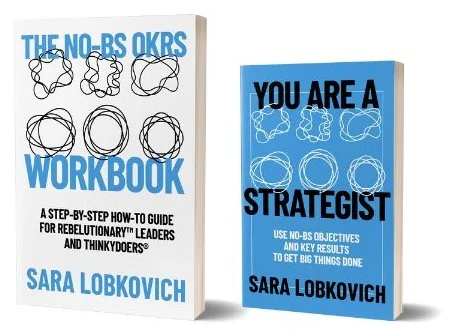
Get the Book
You Are a Strategist teaches you how to use No-BS OKRs to get big things done. Join 2,000+ coaches trained in this methodology.
Order Your Copy